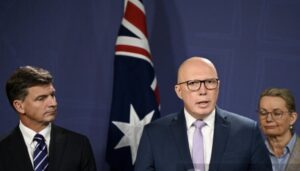Australia’s reputation at the international climate change talks hit a new low on Wednesday after the G77 and China took offence at what they described as the hard-line tactics and “bad behaviour” of the Australian negotiators and walked out of a crucial meeting.
The Australian delegation was accused of blocking all avenues of agreement, placing brackets around any text that was approaching consensus and, worst of all – of wearing t-shirts, “giggling”, and of being “cavalier and insensitive.”
Saleemul Huq, a scientific advisor on the issue of loss and damage to the 132 nations who make up the G77 and China negotiating bloc, said G77 negotiators had walked out of talks at 4am on Wednesday.
“There was continuous blockage of anything they wanted from Australia who were putting brackets around everything,” he said. “The behaviour of Australia’s negotiators was poor, they were being extremely insensitive, wearing t-shirts …
“This is a serious issue. We are talking about life and death, people are dying from Typhoon Haiyan, we’ve got people on hunger strike here. You don’t trivialise these issues, by giggling, and marking brackets around anything. It is just not done.”
It should be noted that in the institutionalised chaos of international climate talks, particularly in the final days of negotiations, grandstanding is commonplace. But in this fishbowl world of the UN-sponsored talks in the National Stadium in Warsaw, Australia has now become the whipping boy of climate politics.
The fact that Australian negotiators were casually dressed at the time is not in dispute (although there seems to be some speculation over whether they were wearing t-shirts or pyjamas! As it turns out, RenewEconomy has seen photos of the meeting, and it is t-shirts). But the fact that it is now used as a lightning rod in negotiations shows how far Australia’s stocks have fallen in the past few weeks.

One EU negotiator questioned whether there was a walk-out, suggesting the meeting was breaking up anyway. But the negotiator said casual wear was not deemed appropriate “out of respect” for the other. Stinky is tolerated, t-shirts not.
Some observers say Australia’s poor reputation is not entirely deserved, because some developing countries are taking an equally hard line attitude on some crucial issues – for instance in their refusal to be drawn into committing to their own emission reduction targets. Developed countries see this as an equally provocative move that could short-circuit a Paris agreement.
But these and other observers note that Australia had set itself up as the fall-guy of these talks because it has dumped its previously constructive approach to negotiations and adopted a new hardline stance under the new conservative government of Tony Abbott … and because Abbott’s three-word sloganeering, on the domestic stage and even at the Commonwealth Heads of Government meeting in Sri Lanka, and his dismantling of climate policies and institutions has been well noted.
Alf Wills, the lead negotiator of South Africa – which is chairing the negotiations on loss and damage and is one of four countries that make up the powerful BASIC group (Brazil, South Africa, India and China) – said there was disappointment at Australia going no further than its “absolutely least ambitious” emissions reduction target of 5 per cent.
“We are mindful that the Australian government has recently changed, and has a different policy,” he told RenewEconomy. “What is disappointing for us is the comment made by the new prime minister that Australia will only do minus 5%.
“For us it just reinforces the concept that these numbers need to be internationally legally binding, because if governments change, can they just unilaterally change their international commitments … on the basis that they say that wasn’t us, that was someone else?”
Australia, along with Canada and Japan, is accused of adopting an unusually hard-line approach to the talks, not just in loss and damage, but also on the issue of climate finance and the level of ambition. International delegates are surprised and shocked at the turnaround in policies since the new government.
Negotiators say the Australian delegation had come to Poland with seemingly little room for maneouvre. Some suggested that this was because of a lack of guidance from Canberra, which is not sending any ministerial representative, despite Australia’s influential role as chair of the Umbrella Group, the bloc that represents the non-EU developed countries, and its role in the Cartagena Dialogue, a moderate grouping that aims to seek middle ground on negotiating extremes.
Bangladesh, which insisted that what occurred in the early hours of Wednesday was a walk-out, said the political change in Australia has completely reversed its position. “How do we try to negotiate with them,” said its head of delegation.
He reproached Australia for intervening on its own behalf, rather than within its negotiating group. “We expect more back-room diplomacy rather than upfront confrontation, which is what you are seeing now,” he said.
Alden Meyer, from the Union of Concerned Scientists and a veteran observer of these talks, said Australia had previously done “a fairly good job” of co-ordinating the Umbrella Group and taking a responsible position.
“I know Justin (Lee, the delegation head) has been trying to be constructive, but for whatever reason they are in a totally different mode of behaviour here,” Meyer said.
“I have seen some pretty bad behaviour over the years, in terms of negotiating tactics and hardball politics – but I haven’t seen people coming with an apparent cavalier attitude.”
Loss and damage is a critical issue for the G77 nations, but a sensitive one for the developed world, who fear that they will have to make payments as compensation for past emissions to affected countries, and have ruled that out.
The Warsaw meeting was supposed to be seeking agreement on the institutional arrangements. The question of money is not on the table (Australia would be offering only help “in kind” in any case). However, the developed and the developing world differ on how the institution should be set up.
“The loss and damage stream is the only stream in Warsaw where we expect a decision,” Huq said. “Everything else is preparation for Paris. Warsaw does not make or break anything. Except loss and damage.”
“In Doha everyone agreed that in Warsaw we would discuss institutional arrangements for this. G77 demands a new mechanism, not just a talk shop, but a talk and do shop. It may be symbolic, but it matters to these countries.
“The US and others have been negotiating at a technical level in good faith. It broke down last night because of the Australians.”
Meyer pointed out that no developed country is in favour on financial compensation on the issue of loss and damage.
“By blocking a mechanism, you are saying you fear that you will be forced into compensation at some point down the road.
“No one is going to able to force the EU, the US, and other developed countries into accepting compensation based mechanism. That is very clear, they are not going to go there, but that is being used as the bogeyman.”
(In another development at these talks, Poland has sacked its environment minister Marcin Korolec, who was blamed for holding up work on new shale gas legislation, and replaced him with a deputy finance minister, Maciej Grabowski, who had been responsible for pushing through shale gas legislation. After the Polish government hosted a coal conference earlier this week, this is seen as a bad sign, but Korolec will retain his role as president of the COP19).










